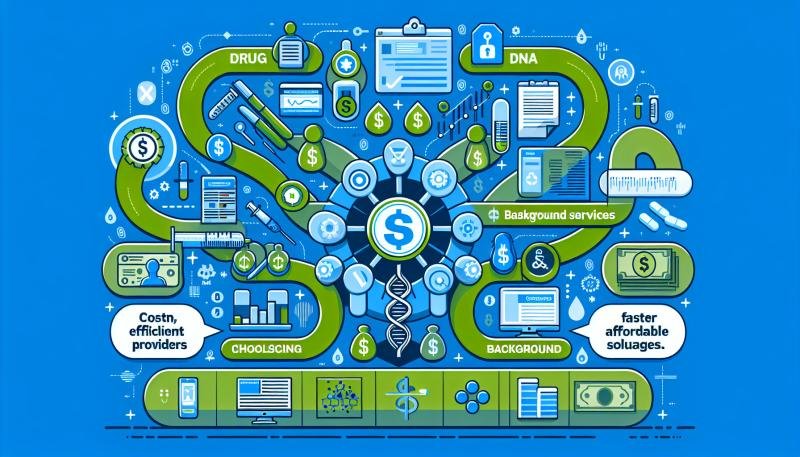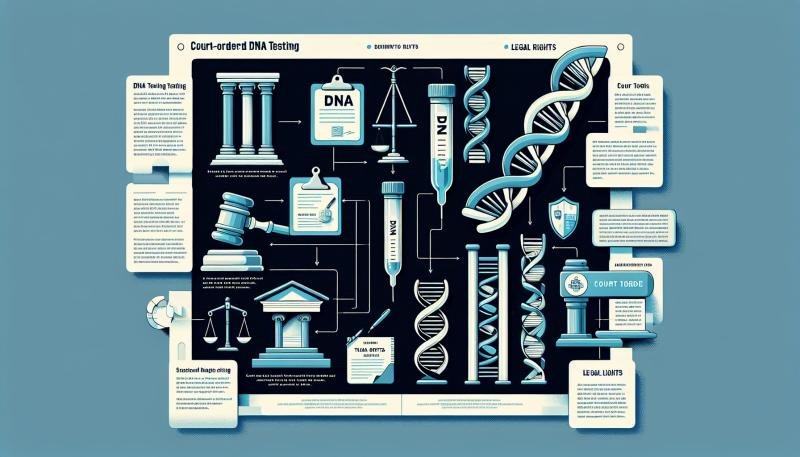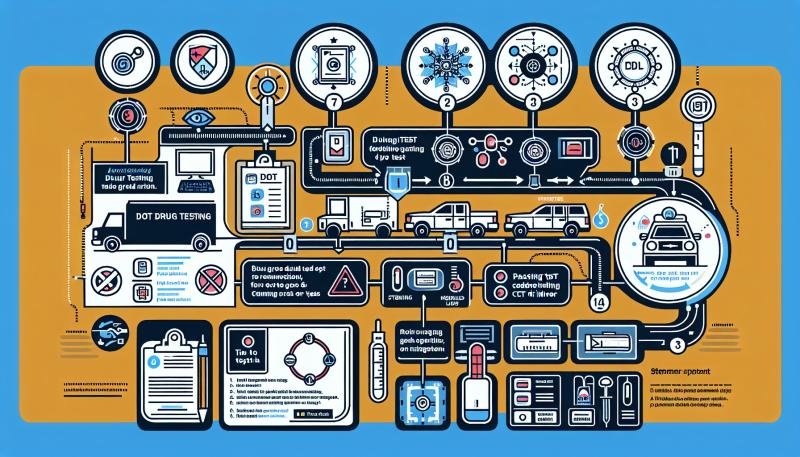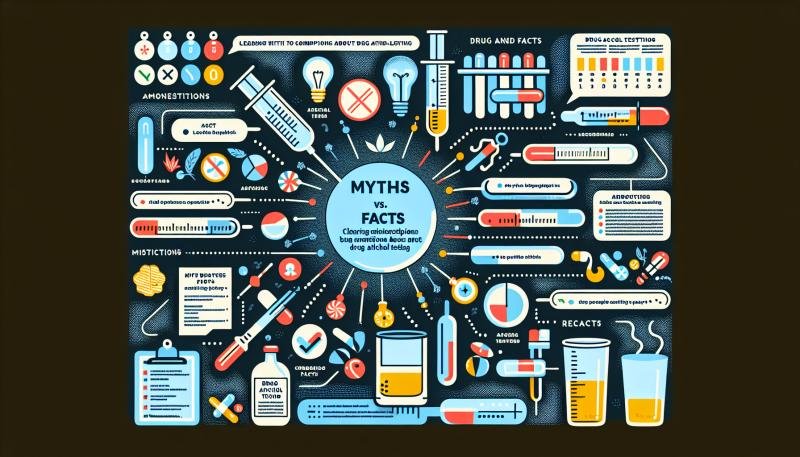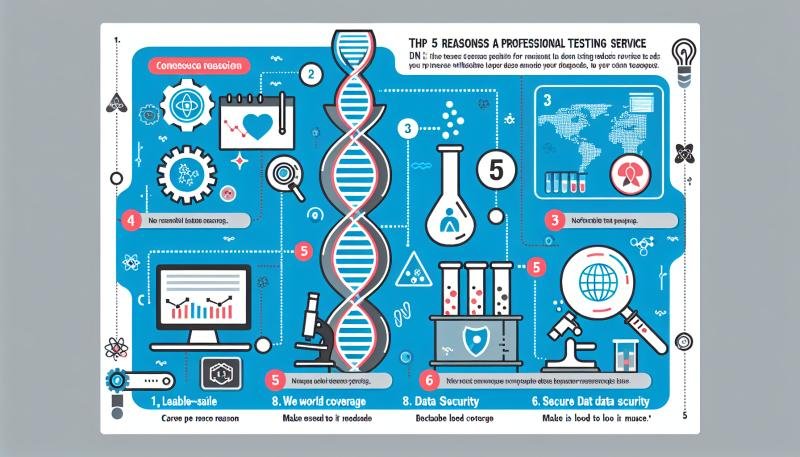
Popular Articles
Affordable Testing Solutions: How to Save on Drug, DNA, and Background Services
In today’s fast-paced world, services like drug testing, DNA analysis,...
Read MoreWhy Pre-Employment Background Checks Are a Win-Win for Employers and Applicants
In today’s competitive job market, pre-employment background checks have become...
Read MoreUnderstanding Court-Ordered DNA Testing and Your Legal Rights
In today’s legal landscape, court-ordered DNA testing plays a vital...
Read MoreThe Benefits of Routine Drug and Alcohol Testing for Personal Wellness
In today’s wellness-focused world, more individuals are taking active steps...
Read MoreNavigating the DOT Drug Testing Process: Tips for First-Time CDL Drivers
Starting your career as a Commercial Driver’s License (CDL) holder...
Read MoreMyths vs. Facts: Clearing Up Misconceptions About Drug and Alcohol Testing
Drug and alcohol testing is a critical tool in maintaining...
Read MoreThe Top 5 Reasons to Use a Professional Testing Service for DNA Needs
Whether you’re exploring your ancestry, confirming biological relationships, or uncovering...
Read MoreHow Background Checks Protect Your Family When Hiring Caregivers
Hiring a caregiver is a deeply personal and important decision....
Read MorePopular FAQ's
There are several common reasons why someone might need or choose to undergo drug or alcohol testing, including:
Employment Screening:
Many employers require drug testing during the hiring process to ensure a safe and productive work environment.Random Testing in the Workplace:
In certain industries, especially those involving safety-sensitive jobs, employers may conduct random drug or alcohol tests to maintain employee safety and regulatory compliance.Legal or Court-Ordered Testing:
Courts may order drug or alcohol testing in cases such as child custody disputes, probation requirements, or DUI offenses to monitor compliance with legal conditions.Rehabilitation and Recovery Monitoring:
Individuals undergoing treatment for substance abuse may be regularly tested to verify abstinence and track recovery progress.Personal Testing:
Some people choose to self-test to confirm they are free of drugs or alcohol before applying for jobs or returning to activities that require sobriety.
Drug testing is a key part of staying sober and recovering from substance use. It helps individuals by:
Keeping Accountability: Regular tests remind individuals to stay committed to their drug-free goals.
Encouraging Motivation: Knowing tests are scheduled motivates people to avoid using drugs.
Detecting Relapse Early: Tests can spot a relapse quickly, so help and support can be given right away.
Building Trust: Negative test results build trust with family, counselors, and employers.
Overall, drug testing helps people stay on track and maintain long-term recovery.
testing is available for various purposes, including personal, legal, and health-related needs. Here’s a breakdown:
Personal Testing
Peace of Mind: Many individuals choose testing to stay informed about their health or lifestyle.
Travel Requirements: Some countries or regions require a negative test result before allowing entry.
Workplace Needs: Employers might ask for test results to ensure safety and compliance at work.
Legal Testing
Identification and Ancestry: DNA tests help confirm family relationships or trace lineage.
Custody Disputes: Courts often require genetic testing to verify biological connections.
Substance Testing: Drug or alcohol tests may be ordered by courts for various legal cases.
Health-Related Testing
Diagnosis: Tests help identify the cause of symptoms you may be experiencing.
Preventive Screening: Regular tests can detect potential health issues early on.
Chronic Condition Management: Ongoing testing supports monitoring and managing existing health concerns.
For more details or to find a nearby testing facility, you can consult your healthcare provider or search online for local resources.
you can order a drug test for personal use. Many companies offer drug testing kits that are available online or at local pharmacies. These kits are designed for individual use, helping you monitor substance use or prepare for employment screenings.
Types of Drug Tests Available
Urine Tests: The most common and affordable option, easy to use at home.
Saliva Tests: Good for detecting recent drug use within a short window.
Hair Tests: Can detect drug use over a longer period but tend to be more expensive.
Blood Tests: Very accurate but usually require a healthcare professional for sample collection.
How to Order
Determine the type of test that fits your needs.
Look for reputable companies offering FDA-approved kits for reliable results.
Purchase through a trusted online store or visit your local pharmacy.
Follow the instructions carefully to ensure accurate testing.
Things to Keep in Mind
Make sure the test covers the specific drugs you want to detect.
Some tests may need to be sent to a lab, which can affect cost and result timing.
Understand the legal aspects of drug use in your area to stay compliant with local laws.
Ordering a personal drug test offers a convenient way to gain clear insight into any substances present in your system.
Both multi-panel and single-panel tests have their own advantages depending on the situation. Here’s a simple breakdown to help you understand their differences and uses:
Multi-Panel Tests
Coverage: These tests screen for multiple markers, diseases, or conditions at once, giving a broader overview of your health.
Convenience: They reduce the need for multiple visits or separate tests, saving you time and effort.
Cost-Effectiveness: Although they may cost more upfront, they can be more economical than ordering many individual tests.
Comprehensive Screening: Great for initial health evaluations or when your doctor suspects several possible issues.
Single-Panel Tests
Specificity: Focus on one particular marker or condition, providing detailed and precise information.
Cost: Usually less expensive, ideal if you need to check or monitor a specific issue.
Targeted Use: Best for follow-up testing or when broad screening isn’t necessary.
In Summary:
Multi-panel tests offer a wider, more comprehensive picture, useful when multiple conditions are possible. Single-panel tests provide in-depth information about one specific condition. Your healthcare provider can guide you on which type is best based on your health needs.
Testing minors for drugs or alcohol involves special legal and ethical considerations. Here are some common questions and important points to know:
1. Is Parental Consent Required?
Yes, parental or guardian consent is usually required before testing minors, especially outside of emergency or legal situations. This ensures parents are informed and can provide support throughout the process.
2. Are Schools Allowed to Test Minors?
Many schools have policies that allow drug and alcohol testing, often tied to participation in sports or extracurricular activities. Schools must follow state laws and protect student privacy when conducting these tests.
3. Can Minors Refuse Testing?
Whether a minor can refuse testing depends on the context. In schools, refusal may have consequences according to policy, while in legal cases, court orders often override refusal. Parents or guardians typically hold the authority to consent or decline.
4. What Are the Implications of Test Results?
Test outcomes can affect school records, lead to legal or disciplinary actions, or involve social services. It’s important for both parents and minors to understand the potential consequences.
Summary:
Decisions about testing minors should be made carefully, respecting legal requirements and the minor’s rights. Consulting legal or healthcare professionals is recommended to navigate these sensitive situations appropriately.
Synthetic drugs such as K2 or Spice contain various synthetic cannabinoids, which can be challenging to detect with standard drug tests. Specialized testing methods are required to identify these substances due to their unique and ever-changing chemical structures. Here’s how the testing process typically works:
Sample Collection
A biological sample is collected from the individual suspected of using synthetic cannabinoids. Common samples include urine, blood, or hair.
Screening Tests
Initial screening uses advanced techniques like gas chromatography-mass spectrometry (GC-MS) or liquid chromatography-tandem mass spectrometry (LC-MS/MS) to detect the presence of synthetic cannabinoids.
Confirmation Tests
If the screening test is positive or inconclusive, a more precise confirmation test is performed. These tests are highly sensitive and can accurately identify specific synthetic cannabinoids, distinguishing between different compounds.
Challenges and Updates
Because synthetic drugs frequently change their chemical formulas to avoid detection, testing laboratories continuously update their methods to keep up with new variants.
What This Means for Consumers
Understanding that synthetic drug tests have limits and may not detect all formulations is important for interpreting results responsibly.
medications you take can sometimes influence the results of medical or diagnostic tests. Here are key points to keep in mind:
Type of Test
The impact of medications depends on the type of test—whether it’s blood, urine, or another diagnostic method—as different tests interact differently with medications.
Medication Types
Various medications can affect test outcomes, including:
Antibiotics: May interfere with tests related to gut bacteria.
Antihistamines: Can affect allergy test results.
Blood Thinners: Might influence blood clotting or coagulation tests.
Duration and Dosage
How long and at what dose you have taken a medication can change its effect on test results. Long-term use might have different impacts than short-term use.
Consult Your Healthcare Provider
Always inform your doctor or the testing laboratory about any medications or supplements you are taking. They can advise if you should pause certain medications before testing to ensure accurate results.
Summary
Being open about your medication use is essential for the correct interpretation of test results and avoiding misleading outcomes.
Getting tested promptly after an incident involving drugs or alcohol is important for accurate results and timely response. Here’s what you should know about the timing of various tests:
Types of Tests and Detection Windows
Alcohol Testing: Blood, breath, and saliva tests can detect alcohol almost immediately after consumption. For best accuracy, testing should be done as soon as possible following the incident.
Urine Drug Testing: Commonly used for screening, these tests can detect drug use typically within a few hours up to several days, depending on the substance involved.
Hair Follicle Drug Testing: These tests have a longer detection window—usually from 7 days up to 90 days after use—but are not suitable for immediate post-incident testing.
Oral Fluid (Saliva) Drug Testing: Effective for detecting recent drug use, usually within minutes to about 48 hours after consumption, making them ideal for quick screenings.
When Should You Test?
The ideal timing depends on the substance and test type. For immediate detection, breathalyzers (for alcohol) and oral fluid tests (for drugs) offer the fastest results. Urine and hair tests are better for detecting use over longer periods.
Additional Tips
Choose a testing method appropriate for the suspected substance.
Consult a healthcare professional or testing provider if you’re unsure which test is best for your situation.
Acting quickly after the incident increases the likelihood of accurate results and appropriate next steps.
you can schedule a drug or alcohol test weeks after an incident, but there are important factors to consider:
Eligibility and Timing
Determine if testing is still meaningful based on the time elapsed and the type of test. Some tests may no longer detect substances accurately after several weeks, depending on the drug or alcohol involved.
How to Schedule a Test
Contact a reputable testing center or healthcare provider to explain your situation.
Provide details about the incident, including the date and any symptoms or concerns.
Ask which tests are available and most appropriate for your case.
Inquire about any preparations needed before testing (e.g., fasting, avoiding medications).
Schedule the appointment at a time and place convenient for you.
Additional Considerations
Insurance may not cover tests done for incidents that are not recent or symptomatic.
The accuracy of some tests diminishes as more time passes after the incident.
Always consult with a healthcare professional for personalized advice.
By following these steps, you can take the right approach to testing even if weeks have passed since the incident.
Yes, you can change or cancel your appointment after booking. Please keep the following in mind:
Time Frame:
Changes or cancellations must be made at least 24 hours before your scheduled appointment. Requests made later than this may incur a fee.
How to Change or Cancel:
Log in to your account on our website or app.
Go to the “My Appointments” section.
Select the appointment you wish to modify or cancel and follow the prompts.
Confirmation:
After your request is processed, you will receive a confirmation email. If you do not receive this, please contact our support team to confirm your change or cancellation.
To make your shopping experience smooth and secure, we offer a variety of payment options to suit your preferences:
1. Credit and Debit Cards
Visa
MasterCard
American Express
Discover
2. Digital Wallets
PayPal
Apple Pay
Google Pay
3. Bank Transfers
ACH Transfer (U.S. customers)
SEPA Transfer (for European customers)
4. Buy Now, Pay Later Options
Affirm
Klarna
Afterpay
5. Gift Cards
If you have a gift card, simply enter the code at checkout to redeem it.
We prioritize your security and ensure all transactions are safely processed. If you have any questions about payments, feel free to contact our customer support team.
Thank you for choosing us — happy shopping!
Your privacy is extremely important to us. We are dedicated to protecting your personal information, including your test results. Here’s how we keep your data confidential and secure:
Data Security
We use industry-standard encryption to protect your data during transfer and storage.
Our systems undergo regular audits and updates to prevent unauthorized access.
Access Control
Only authorized personnel with a valid reason can access your information.
You control who can see your test results and can choose to share them with trusted healthcare providers or family members if you wish.
Compliance
We comply with all applicable privacy laws and regulations, including HIPAA, to safeguard your rights.
Your consent is required before sharing your information with any third parties beyond the testing process.
Transparency
We clearly explain how your data is used and stored.
You have the right to request access to or deletion of your data at any time.
With these protections in place, you can have peace of mind knowing your test results are handled with the utmost confidentiality and care.
individuals receiving medical treatment can still take a drug test. However, there are some important points to consider to ensure accurate results:
Notify the Test Administrator
Be sure to inform the person administering the test about any current medical treatments and prescribed medications you are using. This helps provide context and assists in interpreting the results correctly.
Potential Medication Interference
Some medications may affect drug test outcomes, possibly causing false positives or negatives. It’s important to discuss with your healthcare provider whether your medications could influence the test.
Documentation and Proof
Keep documentation such as prescriptions or notes from your healthcare provider handy. This can help explain any unexpected test results and provide necessary verification.
Alternative Testing Options
If standard drug tests may be problematic due to your treatment, ask about alternative testing methods that might better suit your situation.
In summary, drug testing during medical treatment is possible, but transparency and communication are key to ensuring fair and accurate results.
If a substance isn’t included in the standard test panel, it means that the default set of tests performed by the laboratory does not cover it. However, this doesn’t mean the substance cannot be tested. Here’s what you can do:
Options for Testing Unlisted Substances
Custom Testing Requests: Many laboratories offer custom or expanded testing options. You can specifically request tests for substances not included in the standard panel.
Consultation: Contact the lab’s customer service or speak with a professional for advice on available tests or alternative options.
Additional Fees: Keep in mind that custom tests often involve extra costs due to the additional resources and time required.
Why Custom Testing Might Be Needed
Specific Concerns: You may want to test for certain substances due to personal, occupational, or environmental exposure.
Comprehensive Results: For greater peace of mind, a more thorough analysis that covers all potential substances may be desired.
Next Steps
Reach out to your testing facility to discuss your specific needs. They can recommend the best testing approach to ensure accurate and complete results tailored to your situation.
1. Suggested Testing Frequency
Monthly: Often recommended during the early stages of recovery to ensure accountability and monitor progress.
Quarterly: As stability improves, quarterly testing may provide continued support without being overly intrusive.
Annually: For those in long-term, stable recovery, yearly testing might be sufficient for ongoing check-ins.
2. Influencing Factors
Several elements can impact how often you should be tested, including:
Existing or emerging medical conditions
Changes in physical or mental health symptoms
Modifications to medications or treatment plans
3. Professional Guidance Is Key
Your healthcare provider is the best resource for determining an appropriate testing schedule. They will consider your full medical history and current condition to create a personalized plan that supports your recovery goals.
Conclusion:
Consistent and appropriately timed testing is a valuable tool in supporting long-term sobriety. Staying in communication with your care team and following their advice can help ensure a healthy and successful recovery.

